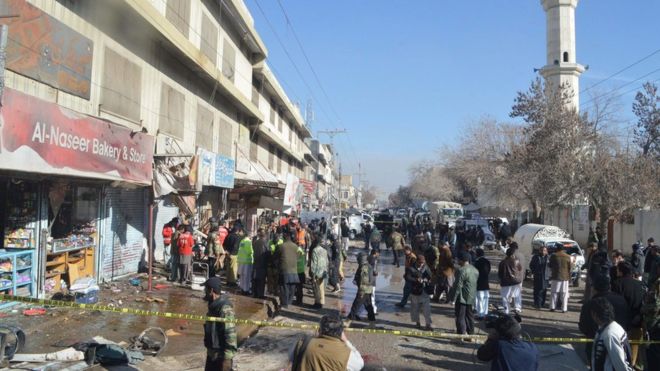Deadly bomb near Pakistan polio centre

At least 14 people have been killed in a bombing outside a polio vaccination centre in the south-western Pakistani city of Quetta, officials say.
Many of the casualties are thought to have been police guarding the clinic.
Armed guards are routine for polio workers in Pakistan, who have been the target of many deadly attacks by Islamist militants in recent years.
Militants oppose polio vaccination, saying it is a Western conspiracy to sterilise Pakistani children.
Pakistan and Afghanistan are the only two countries where the disease is still endemic.
'War zone'
The explosion took place in the early morning as polio workers and security staff were reporting for duty before heading out on their vaccination rounds, said Sarfaraz Bugti, a minister in Balochistan province of which Quetta is the capital.
Local police said the blast killed 12 policemen, one paramilitary soldier and a civilian. About 20 people were injured.
"We are living in a war zone and I can't say anything about the nature of the blast," Mr Bugti is quoted by the AFP news agency as saying.
Analysis: M Ilyas Khan, BBC News, Islamabad
This is one of the bloodiest attacks targeting a polio vaccination campaign in the Balochistan region in recent months.
It comes in the wake of a sharp fall in militant attacks in Pakistan, mainly caused by a ground offensive the military launched in June 2014 to clear the North Waziristan region of Taliban militants. As such, it serves as a stark reminder that door-to-door polio vaccination continues to be a hazardous occupation.
While no-one has yet claimed responsibility for the attack, Balochistan is torn by an armed separatist conflict, and is said to be home to Afghan Taliban as well as some local armed groups with Islamist leanings who oppose separatists and are therefore known to have the backing of some official quarters.
The attack comes amid rising political differences among central and provincial politicians over the details of a $46bn economic corridor that China is funding to link its north-western region with Gwadar, a coastal town in Balochistan. There are fears that attacks like this could jeopardise Chinese investment.
Pakistan recorded more than 300 polio cases in 2014 — its highest number since 1999. Most of the new infections were in north-west Pakistan, where militants regularly target roving health teams, and health officials blamed the rise in cases on several deadly attacks on police workers that year.
The number of cases fell to 52 in 2015, reports the BBC's Shahzeb Jillani. This was largely because vaccination teams could reach areas that were previously off limits because of militancy.
The last attack on a polio target in Pakistan is thought to have taken place in north-western Swabi district in November 2015, when the local polio co-ordinator was shot dead by unidentified gunmen.
Политика конфиденциальности | Правила пользования сайтом








